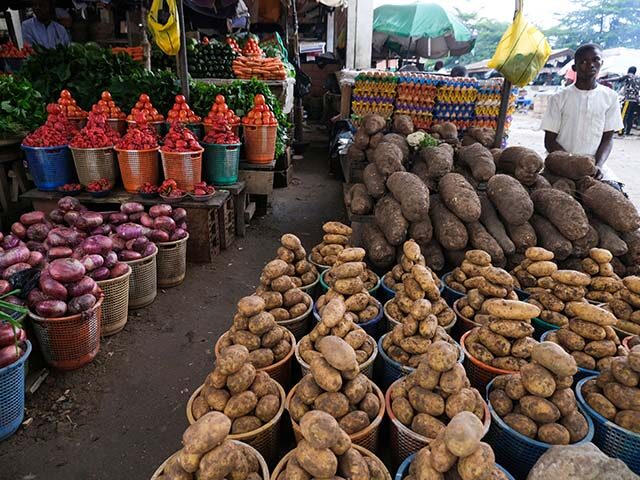Nigerian President Bola Tinubu on Thursday declared a “state of emergency on food security” due to swiftly rising prices. Nigeria is the largest economy on the African continent, although its per capita income is about half of the number two economy, Egypt.
Tinubu’s spokesman Dele Alake said on Thursday that the state of emergency was “in line with this administration’s position on ensuring that the most vulnerable are supported.”
“As a hands-on-leader who follows developments across the country every day, Mr. President is not unmindful of the rising cost of food and how it affects the citizens,” Alake boasted on Tinubu’s behalf.
“While availability is not a problem, affordability has been a major issue for many Nigerians in all parts of the country. This has led to a significant drop in demand thereby undermining the viability of the entire agriculture and food value chain,” he said.
Tinubu’s emergency order placed “all matters pertaining to food and water availability and affordability” under the “purview” of his National Security Council. Alake said the council would soon announce a series of initiatives to “reverse this inflationary trend and guarantee future uninterrupted supplies of affordable foods to ordinary Nigerians.”
“In the immediate term, we intend to deploy some savings from the fuel subsidy removal into the Agricultural sector focusing on revamping the agricultural sector,” he said.
Alake said the government would “immediately release fertilizers and grains to farmers and households to mitigate the effects of the subsidy removal,” as well as improving irrigation, providing better transportation for food products, making more land available to farmers, and setting up a “National Commodity Board” to “moderate spikes and dips in food prices.”
The presidential spokesman committed to better security for farmers so they can “return to farmlands without fear of attacks.”
Islamic extremist rebels have been attacking farmers in northeastern Nigeria, in some cases beheading them. Over 35,000 people have been murdered by these insurgents since 2009, many at the hands of Boko Haram, which formally became the Islamic State-West Africa Province (ISWAP) in 2015.
“Principally, one of the major positive outcomes of these interventions will be a massive boost in employment and job creation,” he promised, noting that agriculture currently accounts for about 35 percent of Nigerian jobs and ambitiously promising to double it to 70 percent “in the long term.”
“Our president is the president of all Nigerians and the father of the nation. The renewed hope mandate remains alive and no one, absolutely no one, will be left behind,” he declared.
Although Tinubu’s spokesman effusively praised him for being in touch with the needs of Nigeria’s people and leaping swiftly into action, the food security crisis has been developing for years. The Wuhan coronavirus pandemic was a major contributing factor, as was global food inflation due to the Russian invasion of Ukraine. Nigeria has one of the worst chronic food insecurity problems in the developing world, especially in the turbulent north of the country.
UNICEF warned in January that nearly 25 million Nigerians were at risk of hunger due to terrorism, banditry, reduced harvests due to flooding, and large numbers of refugees.
Some humanitarian groups say Nigeria’s growing food insecurity problem was caused by an excessive focus on oil exports and questionable fiscal policies, such as currency devaluation. Nigerian agriculture is highly dependent upon small farmers who are vulnerable to bandits and have little capital for dealing with setbacks such as poor weather.
Soon after he was sworn in as president in May, Tinubu canceled popular subsidies for fuel, causing gas prices to nearly triple. The higher fuel costs hit small farmers exceptionally hard.
“I assure you that your sacrifice shall not be in vain. The government I lead will repay you through massive investment in transportation infrastructure, education, regular power supply, healthcare and other public utilities,” Tinubu promised in June.

COMMENTS
Please let us know if you're having issues with commenting.